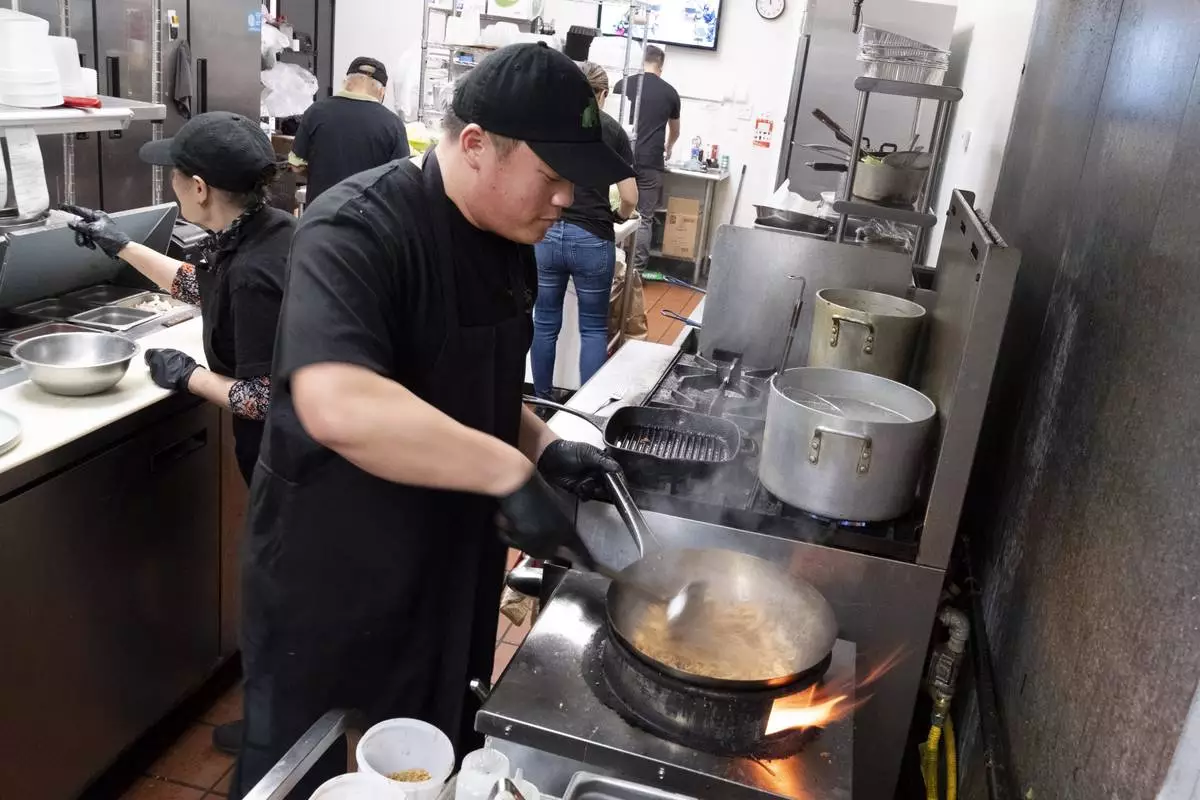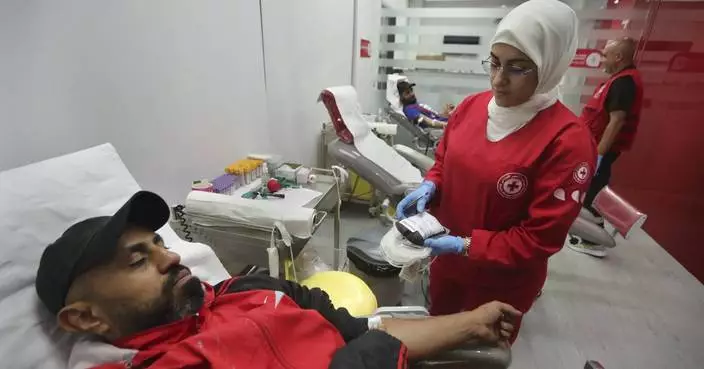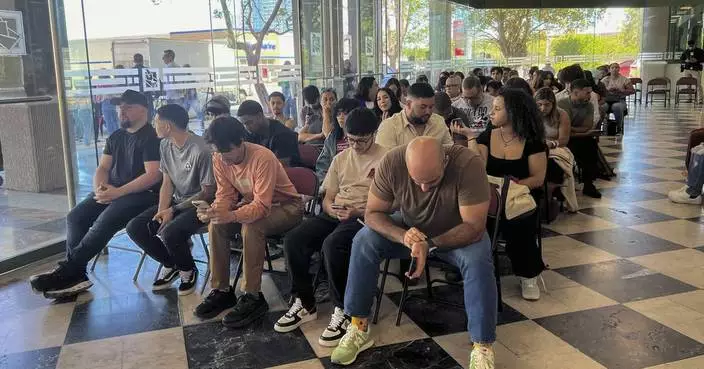NEW YORK (AP) — It's a practice that's about as American as apple pie — accusing immigrant and minority communities of engaging in bizarre or disgusting behaviors when it comes to what and how they eat and drink, a kind of shorthand for saying they don't belong.
The latest iteration came at Tuesday's presidential debate, when former President Donald Trump spotlighted a false online tempest around the Haitian immigrant community of Springfield, Ohio. He repeated the groundless claim previously spread by his running mate, JD Vance, that the immigrants were stealing dogs and cats, the precious pets belonging to their American neighbors, and eating them. The furor got enough attention that officials had to step in to refute it, saying there was no credible evidence of any such thing.
But while it might be enough to turn your stomach, such food-based accusations are not new. Far from it.
Food-related scorn and insults were hurled at immigrant Chinese communities on the West Coast in the late 1800s as they started coming to the United States in larger numbers, and in later decades spread to other Asian and Pacific Islander communities like Thai or Vietnamese. As recently as last year, a Thai restaurant in California was hit with the stereotype, which caused such an outpouring of undeserved vitriol that the owner had to close and move to another location.
Behind it is the idea that “you’re engaging in something that is not just a matter of taste, but a violation of what it is to be human,” says Paul Freedman, a professor of history at Yale University. By tarring Chinese immigrants as those who would eat things Americans would refuse to, it made them the “other.”
Other communities, while not being accused of eating pets, have been criticized for the perceived strangeness of what they were cooking when they were new arrivals, such as Italians using too much garlic or Indians too much curry powder. Minority groups with a longer presence in the country were and are still not exempt from racist stereotypes — think derogatory references to Mexicans and beans or insulting African Americans with remarks about fried chicken and watermelon.
“There’s a slur for almost every ethnicity based on some kind of food that they eat,” says Amy Bentley, professor of nutrition and food studies at New York University. “And so that’s a very good way of disparaging people.”
That's because food isn't just sustenance. Embedded in human eating habits are some of the very building blocks of culture — things that make different peoples distinct and can be commandeered as fodder for ethnic hatred or political polemics.
“We need it to survive, but it’s also highly ritualized and highly symbolic. So the birthday cake, the anniversary, the things are commemorated and celebrated with food and drink,” Bentley says. “It’s just so highly integrated in all parts of our lives.”
And because “there’s specific variations of how humans do those rituals, how they eat, how they have shaped their cuisines, how they eat their food,” she adds, “It can be as a theme of commonality ... or it can be a form of distinct division.”
It's not just the what. Insults can come from the how as well — eating with hands or chopsticks instead of forks and knives, for example. It can be seen in class-based bias against poorer people who didn't have the same access to elaborate table settings or couldn't afford to eat the same way the rich did — and used different, perhaps unfamiliar ingredients out of necessity.
Such disparagement can extend directly into current events. During the Second Gulf War, for example, Americans angry at France's opposition to the U.S. invasion of Iraq started calling french fries “freedom fries.” And a much-used insulting term in the United States for Germans during the first two world wars was “krauts” — a slam on a culture where sauerkraut was a traditional food.
“Just what was wrong with the way urban immigrants ate?” Donna R. Gabaccia wrote in her 1998 book, “We Are What We Eat: Ethnic Food and the Making of Americans.” In reviewing attitudes of the early 20th century and its demands for “100% Americanism,” she noted that “sauerkraut became ‘victory cabbage’" and one account complained of an Italian family “still eating spaghetti, not yet assimilated.”
Such stereotypes have persisted despite the fact that the American palate has significantly expanded in recent decades, thanks in part to the influx of those immigrant communities, with grocery stores carrying a wealth of ingredients that would baffle previous generations. The rise of restaurant culture has introduced many diners to authentic examples of cuisines they might have needed a passport to access in other eras.
After all, Bentley says, “when immigrants migrate to a different country, they bring their foodways with them and maintain them as they can. ... It’s so reminiscent of family, community, home. They’re just really material, multisensory manifestations of who we are.”
Haitian food is just one example of that. Communities like those found in New York City and south Florida have added to the culinary landscape, using ingredients like goat, plantains and cassava.
So when Trump said that immigrants in Springfield — whom he called “the people that came in” — were eating dogs and cats and “the pets of the people that live there,” the echoes of his remarks played into not just food but culture itself.
And even though the American palate has broadened in recent decades, the persistence of food stereotypes — and outright insults, whether based in fact or completely made up — shows that just because Americans eat more broadly, it doesn't mean that carries over into tolerance or nuance about other groups.
“It’s a fallacy to think that,” Freedman says. “It’s like the tourism fallacy that travel makes us more understanding of diversity. The best example right now is Mexican food. Lots and lots of people like Mexican food AND think that immigration needs to be stopped. There’s no link between enjoyment of a foreigner’s cuisine and that openness.”

FILE - Tito Thepkaysone cooks up some pad Thai at "Love & Thai" restaurant in Fresno, Calif., Wednesday, Dec. 20, 2023. The Thai restaurant was wrongfully accused of abusing a dog to turn it into meat, a false claim rooted in a racist stereotype. (AP Photo/Richard Vogel, File)

FILE - Crispy Pork Belly is presented at "Love & Thai" restaurant in Fresno, Calif., on Dec. 20, 2023. The Thai restaurant was wrongfully accused of abusing a dog to turn it into meat, a false claim rooted in a racist stereotype. (AP Photo/Richard Vogel, File)

A sign hangs from a street light at the intersection of Main Street and Fountain Avenue in Springfield, Ohio, Wednesday, Sept. 11, 2024. (AP Photo/Paul Vernon)

A car drives down Fountain Avenue in Springfield, Ohio, Wednesday, Sept. 11, 2024. (AP Photo/Paul Vernon)
AVIGNON, France (AP) — A 71-year-old French man admitted in court Tuesday that for nearly a decade, he repeatedly drugged his unwitting wife and invited dozens of men to rape her while she lay unconscious in their bed.
His wife of 50 years, who has divorced him since his arrest, also got to speak, telling the court that she feels completely betrayed.
In a trial that has gripped France and raised awareness about sexual violence in the home and beyond, Dominique Pélicot told the court that he also raped his wife, Gisèle Pélicot, and that the 50 men standing trial alongside him understood exactly what they were doing.
“Today I maintain that, along with the other men here, I am a rapist,″ Dominique Pélicot testified. “They knew everything. They can’t say otherwise.”
Pélicot’s testimony marked the most important moment yet in a trial that has shocked the world. Although he previously confessed to investigators, his court testimony will be crucial for the panel of judges to decide on the fate of his co-defendants, who range in age from 26 to 74. Many of them deny having raped Gisèle Pélicot, saying her then-husband had manipulated them or that they believed she was consenting.
Many following the case also hope his testimony might help explain why Dominique Pélicot would subject the mother of his three children to such unconscionable abuse.
Gisèle Pélicot has become a hero to many rape victims and a symbol of the fight against sexual violence in France for agreeing to waive her anonymity in the case, letting the trial be public and appearing openly in front of the media. She shows up every day, passing through the courthouse security line behind men accused of raping her. As she left court during a break Tuesday, supporters brought her flowers.
After days of delay due to what his lawyers said was a kidney stone and urinary tract infection, Dominique Pélicot, seated in a wheelchair, testified that the charges against him are true. With his ex-wife looking on from the packed gallery and his voice trembling and barely audible at times, he started a long day of testimony trying to explain childhood traumas that he said scarred and molded him into the person he became.
“One is not born a pervert, one becomes a pervert,” Pélicot told the judges after recounting, sometimes in tears, being raped by a male hospital nurse at age 9 and being forced to take part in a gang rape at age 14.
Pélicot also said that for years, his father sexually abused a young girl his family had taken in, and that his brother later said their father had invited other men to do the same.
He regretted that his parents didn't let him continue his studies after he turned 14. He said that around that time, he tried to persuade his mother to leave the house with him, but “she never wanted to.”
“I don’t really want to talk about this, I am just ashamed of my father. In the end, I didn’t do any better,'' said Pélicot, who faces 20 years in prison if convicted.
After he spoke about his difficult upbringing, Gisèle Pélicot was given the opportunity to address the court.
“It is hard for me to hear this. For 50 years, I lived with a man. I couldn’t imagine even one second that he could have committed acts of rape,″ she said. “I trusted this man entirely.″
The two looked at each other, him from behind the dock’s glass window and her from the witness stand.
“I am guilty,” he told her. “I regret everything I did. I ask you for forgiveness, even if it is unpardonable.”
Asked if she wanted to respond, Gisèle Pélicot turned and left the stand.
When asked about his feelings toward his ex-wife, Dominique Pélicot said she didn't deserve what he did.
“From my youth, I remember only shocks and traumas, forgotten partly thanks to her,” he said in tears.
At that moment, Gisèle Pélicot put on her sunglasses.
Later, Dominique Pélicot said, “I was crazy about her. She replaced everything. I ruined everything.”
A supermarket security guard caught Pélicot in 2020 secretly shooting video up women’s skirts, according to court documents. During a search of his house and electronic devices, police found thousands of photos and videos of men engaging in sexual acts with Gisèle Pélicot while she appeared to be unconscious in bed.
With the recordings, police were able to track down most of the 72 suspects they were seeking, but not all.
In addition to the photos and videos of Gisèle Pélicot, investigators found photos of the Pelicots' daughter, Caroline Darian, and two daughters-in-law that were surreptitiously taken while they were in their underwear, getting undressed or taking showers, according to authorities.
While her mother has stayed remarkably calm throughout the trial, Darian walked out of the courtroom Tuesday as her father was being asked about photos of her that were found on his laptop.
″Excuse me, I’m going to vomit,″ she said angrily before rushing out. She has written a book about what happened to her family, called ″And I Stopped Calling you Daddy.″
After retiring, the Pélicots moved from the Paris region to a house in Mazan, a small town in the Provence region.
When police officers called Gisèle Pélicot in for questioning in late 2020, she initially told them her husband was “a great guy,″ according to legal documents. They then showed her some photos. She left and later divorced her husband.
Since Dominique Pélicot’s arrest, other cases have surfaced. He was fined after being caught shooting video of a women’s crotch in 2010 and required to see a psychologist. Gisèle Pélicot has said she never knew about this incident.
Under French law, the proceedings inside the courtroom cannot be filmed or photographed. Dominique Pélicot has been brought into the court through a special entrance that's inaccessible for the media, because he and some other defendants are being held in custody during the trial and can't be filmed. Defendants who are not in custody have been arriving at the courthouse wearing surgical masks or hoods to avoid having their faces filmed or photographed.
Among those hoping to secure a seat to watch the Tuesday's proceedings was Bernadette Tessonière, a 69-year-old retiree who lives a half-hour drive from Avignon, where the trial is taking place.
“How is it possible that in 50 years of communal life, one can live next to someone who hides his life so well? This is scary,” she said.

Gisele Pelicot arrives at the Avignon court house, in Avignon, southern France, Tuesday, Sept. 17, 2024. Her ex-husband admitted in court that for nearly a decade, he repeatedly drugged his unwitting wife and invited dozens of men to rape her while she lay unconscious. (AP Photo/Diane Jantet)

Gisele Pelicot arrives at the Avignon court house, in Avignon, southern France, Tuesday, Sept. 17, 2024. Her ex-husband admitted in court that for nearly a decade, he repeatedly drugged his unwitting wife and invited dozens of men to rape her while she lay unconscious. (AP Photo/Diane Jantet)

Gisele Pelicot exits the Avignon court house, in Avignon, southern France, Tuesday, Sept. 17, 2024, after her ex-husband admitted in court that for nearly a decade, he repeatedly drugged his unwitting wife and invited dozens of men to rape her while she lay unconscious. (AP Photo/Diane Jantet)

FILE - Police officers walk in the Avignon court house prior to the trial of Dominique Pelicot, in Avignon, southern France, Thursday, Sept. 5, 2024. (AP Photo/Lewis Joly, File)

FILE - Gisele Pelicot speaks to media as she leaves the Avignon court house, southern France, Thursday, Sept. 5, 2024. (AP Photo/Lewis Joly, File)

FILE - Gisele Pelicot, left, arrives in the Avignon court house, in Avignon, southern France, Thursday, Sept. 5, 2024. (AP Photo/Lewis Joly, File)

FILE - Gisele Pelicot, left, arrives in the Avignon court house, in Avignon, southern France, Thursday, Sept. 5, 2024. (AP Photo/Lewis Joly, File)




















